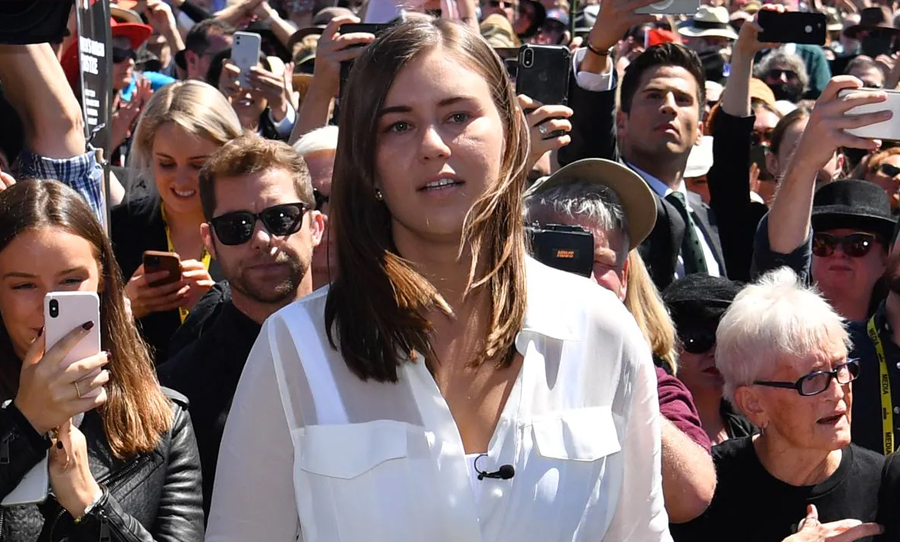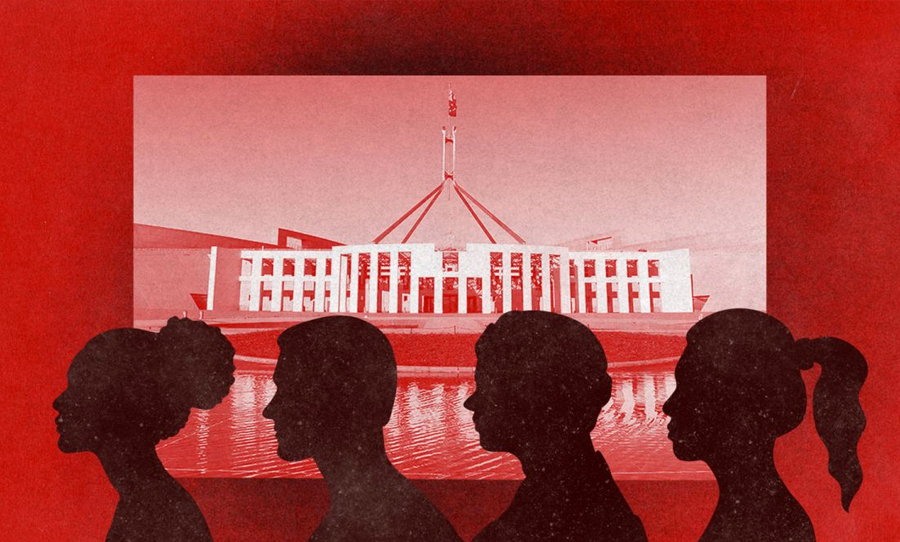Canberra has recently been shaken by the allegations set forth by Brittany Higgins (amongst others) – but for Australian women, the reality of sexual assault has loomed over us for most of our lives.
Stranger danger. Don’t get too drunk. Avoid unfamiliar routes. “Text me when you’re home.” Women have been conditioned to spend their entire lives accomodating every space that they occupy – be it social, professional, personal, whatever you choose – to avoid the looming threat of sexual assault and gendered violence.
Earlier this year, Brittany Higgins, a former political staffer for the Liberal Party, revealed the details of her alleged sexual assault and its aftermath. It sparked an explosive reaction towards the treatment of women in Parliament and the overarching culture of misogyny that governs Canberra, as well as the entire nation.

On February 15 2021, Brittany Higgins alleged that she was raped by a male colleague inside the ministerial office of Defence Minister Linda Reynolds in March 2019. At the time of the assault, Higgins claims that she felt pressured to choose between her career and reporting the allegation to the police.
I loathe and detest how horrendous rape allegations have become a political game.And a lawyer’s picnic. This is now about protecting the reputations of powerful men, not justice for alleged victims As we all knew it would. I feel sick again. #BrittanyHiggins #Kate #Auspol
— Catherine🐀 (@Trillything) March 13, 2021
Higgins’ claim speaks volumes to the potential of sexist, victim-blaming attitudes towards sexual assault allegations – as she was led to feel ostracised by the same people that unquestionably owed her support, empathy, and kindness.
“[Higgins] was finding herself excluded from travelling with [Minister Reynolds] or attending events with her, an arrangement which made [Higgins’] job as a media adviser untenable,” and the young political staffer was forced to seek employment in another ministerial office, as reported by the ABC.
The PM’s handling of both rape allegations is not fitting for a PM. There are so many questions about what happened with Brittany Higgins and whether there was a coverup. To oppose an independent inquiry and accept the AG’s word is beyond reprehensible.
— DrK (@DrKW12) March 12, 2021
The failed duty of care in her case is appalling, especially considering that she continued to work for the Government for the next two years. Higgins’ allegations were perhaps unprecedented by the public, but the story is not unfamiliar to most Australian women. After the allegations surfaced in Canberra, there was an outpouring of support across Australian media, triggering a conversation around the nation’s attitudes towards sexism and sexual assault.
Prime Minister Scott Morrison’s response to the allegations has been widely criticised by the media, as well as Higgins herself and Australian of the Year, advocate for victims of sexual assault, and bonafide icon Grace Tame. His now-infamous invocation of his wife and daughters when referring to the Brittany Higgins’ allegations was roasted by the public – speaking to the broader cultural norm of assigning the objectifying tag of “wife, daughter, sister” to a woman who’s experienced sexual assault, in order to believe her story.
‘Tame … was then asked whether Morrison was living up to his words from 2019, when he said he hoped rape survivors felt they would be believed.
“Clearly not,” she said.’ https://t.co/BNTLDlt55l
— Tricia Dearborn (@TriciaDearborn) March 10, 2021
Unsurprisingly, the man who allegedly committed the atrocities on Brittany Higgins was a repeat offender. Four other women have accused the same man of sexually assaulting them. Those were only a few of the many stories that were shared in the wake of Brittany Higgins’ allegations.
Brittany Higgins is out of a job and must be practically broke but she’s donating her damages payout from Linda Reynolds to a sexual assault support organisation.
She’s a wonderful young woman.— Natasha Robinson (@NC_Robinson) March 12, 2021
Another case that has struck the ire of the Australian public is the allegation of sexual assault in 1988 against – at first, an unnamed senior official, who has now outed himself as Christian Porter, the Attorney General of Australia. He has vehemently denied the accusations and is now suing the ABC for defamation.
Due to the key witness taking her own life in mid-2020, just one day after withdrawing her claim from the Australian Federal Police’s investigation, criminal prosecution of the Porter allegation isn’t possible. That’s why people have been rallying for Scott Morrison to institute an independent inquiry – which, for Christian Porter, would have the possibility to completely exonerate him and solidify his fitness for office.
Independent inquiries are frequently carried out within professional associations, corporations, and government departments when allegations of sexual harassment or bullying are made – so it’s not out of the ordinary for one to be instituted in this case. “Legal and business experts have said there is no “rule of law” issue with the attorney general, Christian Porter, facing an independent inquiry [into the allegation of the assault in 1988],” according to a report by the Guardian.
Unfortunately, Scott Morrison’s response has been disappointing (again). He has clearly rejected calls for an independent inquiry on the basis that it implies the “rule of law and [the] police are not competent to deal with these issues.” As the Prime Minister of Australia, despite his resources and authority to order an investigation of this nature, his resounding denial hits hard.
The process of the independent inquiry is equally a symbolic gesture as it is a fight for justice. Despite the outcome of the enquiry, it’s likely that it won’t result in convictions for Porter – as it can never be investigated as a criminal case, as we discussed earlier. It’s this fact that really draws out the significance of this inquiry.
Women need to know that the justice system, the Prime Minister, and the Government of Australia take sexual assault allegations seriously enough to warrant a fair, legal investigation process. Otherwise, what’s the point? We may as well keep silencing victims. By blaming women for the abhorrent violation done upon their bodies and lives, instead of holding men accountable; by constantly perpetuating this toxic, shameful cycle of victim-shaming.
#EXCLUSIVE: The ex-wife of Attorney-General Christian Porter was among thousands of West Australians to march across the Perth CBD in protest of gender discrimination and violence. 🔒 https://t.co/jg36vWDWu1 pic.twitter.com/CEYnE9jMTL
— The West Australian (@westaustralian) March 14, 2021
Inspired by the allegations in Canberra, the Women’s March 4 Justice rallies have erupted across the nation to protest sexism, misogyny, domestic violence, and sexual violence against women. The Sydney rally was granted a COVID-19 public health order exemption which allowed 1,500 people to gather in groups of 500, as long as they all followed health and safety precautions.
Let this be a moment of change, Canberra. Allow these allegations to be investigated with the full force of the justice system. Just as much as people – like ScoMo – are listening to Christian Porter, women deserve the same chance to be heard. Women deserve the same chance to be believed.



